Female Political Prisoner In Iran Protests Repeated Strip Searches

A female Iranian political prisoner has told her family that she has been repeatedly subjected to strip-down searches in various detention centers.

A female Iranian political prisoner has told her family that she has been repeatedly subjected to strip-down searches in various detention centers.
Mozhgan Kavosi was first arrested in northern Iran during the November 2019 nationwide protests and sentenced to six months in prison by a local prosecutor. Later her sentence increased during an appeal to nearly seven years.
Kavosi, who is a 45-year-old mother of two daughters, belongs to a religious minority but she was charged with propaganda against the regime and an array of other vague political accusations.
Kavosi told her family that every time she was stripped-searched, she told prison guards that she is a political prisoner, not a common criminal and their intrusion into her privacy is simply a psychological pressure tactic.
In line with a recent policy of ‘exiling’ political prisoners to distant prisons, Kavosi is now serving her time in Karaj, near Tehran. The tactic is meant to make it harder for their families to visit them.
Kavosi has also been deprived of her lawyer, Mostafa Nili, who was arrested in August along with others for threatening to sue Supreme Leader Ali Khamenei for banning American and British Covid vaccines and causing thousands of more deaths.
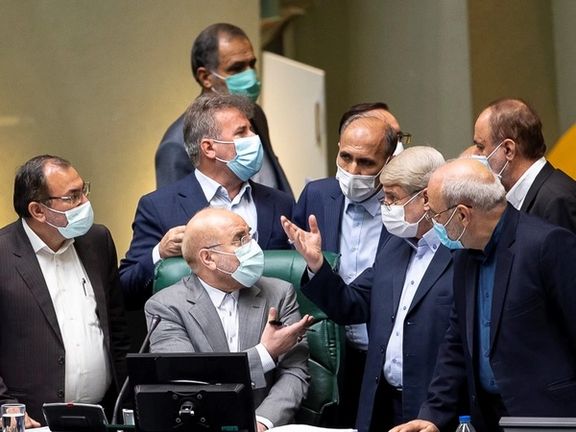
President Ebrahim Raisi's honeymoon with Iran's hardliners in and out of the parliament (Majles) seems to be over, as criticism has mounted.
Iranian media including Etemad daily and Rouydad24 website noted that only 74 days after his inauguration as Iran's new President Raisi (Raeesi) faced serious opposition in the parliament on Sunday.
A day before that, pro-administration news agency ISNA had lashed out at Majles Speaker Mohammad Bagher Ghalibaf for criticizing the Raisi administration and calling it "an incompetent government with inefficient managers.” Only one day after that hardline daily Kayhan, that often speaks for Supreme Leader Ali Khamenei's office, criticized the Raisi administration over the rising price of home appliances.
The media were surprised that it was the like-minded conservative camp and not his political rivals in the reform camp who have started criticizing Raisi's government without even giving him a hundred days for trial and error.
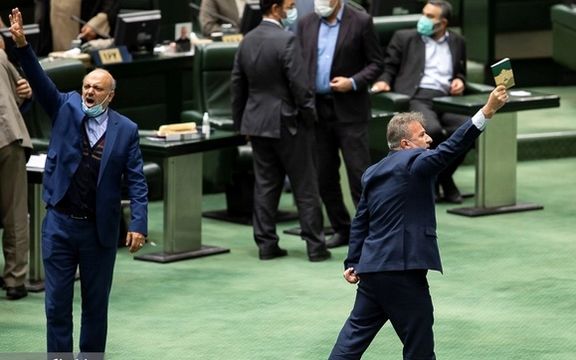
Hardline lawmaker Elias Naderan on Sunday warned Raisi not to try to circumvent the Majles. He made the comment in response to the administration's decision to amend the budget bill to meet some of the long-standing salary demands of Iranian teachers who have been taking to the streets to voice their grievances in recent months. Naderan attributed "most of the country's problems" to "lack of coordination in Raisi's economic team." He asked: "Who is responsible for the situation of the country's economy?"
Meanwhile, Naderan warned Raisi that "The decline of the national economy will inevitably entail an uncontrollable rate of inflation."
Other lawmakers said it was regrettable that they had to address the Raisi administration with the same critical rhetoric they used against the Rouhani administration, Etemad reported. The daily also quoted the lawmakers as saying that "regrettably, Raisi's responses to criticisms is the same as his predecessor's and the problems in question remain the same."
The media agreed that some of the criticism may be motivated by factional and individual expectations but at least part of it highlights demands that have remained unmet as more than two months have passed since Raisi's promises to tackle them.
Ironically, the president was in a meeting of the government's Economic Coordination Board exactly at the same time his economic policies were being questioned by the Majles. The parliament first discussed issues of foreign policy with Foreign Minister Hossein Amir-Abdollahian at a session behind closed doors and then started an open session about the economic and financial issues, including the teachers' case.
According to reports, the general mood at the session was one of disagreement with Raisi's economic policies. One of the MPs close to Ghalibaf even said that the attempt to unify the government has effectively "slaughtered” the revolution. Hardline supporters of Khamenei have taken over all three branches of the government since 2020, with promises that united “revolutionary forces” would work efficiently to solve mounting problems.
One of the advocates of the ‘revolutionary’ brand, Ruhollah Izadkhah, called for "purging the country's management of godfathers and those who pursue their own political goals rather than following the interests of the nation." Izadkhah had earlier warned Raisi to get rid of red tape and not allow wrapping a revolutionary title around inefficient approaches." He told Raisi: "Hand over the government to the people and the youths."
Also in Sunday's session, Ghelich Shadmehr, another lawmaker, harshly criticized the Raisi administration for creating security problems in parts of the country by changing provincial boundaries which he said is an unnecessary measure. Mansur Arami, a lawmaker from Hormozgan Province also raised the same concern about his constituency.
In another development, hardline daily Kayhan referred to Khamenei's order to ban the import of Korean-made home appliances and said the way the government enforced the ban has led to an unusual rise in the price of Iranian-made home appliances. According to Kayhan, as the government did not oversee the operation of Iranian companies, they increased the price of their products without increasing their output and improving quality.

The leader of Lebanon's Iran-backed Hezbollah has declared for the first time on Monday that his powerful militant group has 100,000 trained fighters.
Hassan Nasrallah disclosed the size of the Shiite group's militant arm in his first speech since seven people were killed in gun battles on the streets of Beirut on Thursday.
The confrontation erupted over a long-running probe into last year's massive port blast in the city.
Verifying the numbers of the largely secretive militant group is difficult. If true, it would be larger than Lebanon's armed forces, estimated to at about 85,000. Nasrallah’s claim could also be a scare tactic against opponents in Lebanon.
Hezbollah is also present in Syria, where it has been fighting as part of an array of Iranian-backed forces to help save Bashar al-Assad from his opponents in the civil war.
Thursday's clashes saw gunmen battling each other for several hours with automatic rifles and rocket-propelled grenades in the streets of Beirut.
It was the most violent confrontation in the city in years, echoing the nation's darkest era of the 1975-90 civil war.
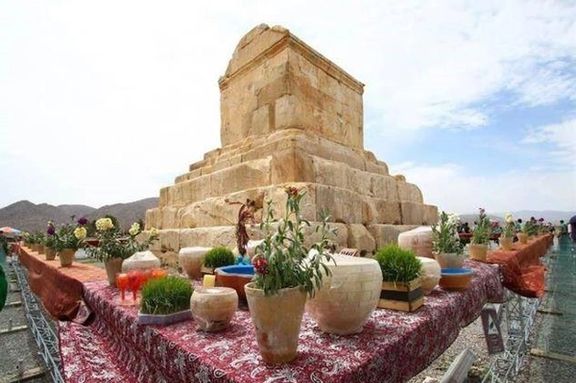
Iran's cultural heritage minister, denied Sunday there was any plan to dig agricultural wells near the tomb of Cyrus the Great in the ancient Achaemenid site, Pasargadae.
Ezzatollah Zarghami told reporters on the sidelines of an exhibition that the government wanted to address farmers’ problems but would not allow wells near the historic monument dating from the 6th-century BC. Zarghami said he had been misunderstood by critics since he said last week, on a visit to the Unesco World Heritage site of Pasargadae, that that the issuing of well permits needed to be reviewed, given problems of irrigating land.
"Zarghami has backtracked and denied his previous remarks about agriculture in Pasargadae and like other authorities has claimed that his remarks were distorted,” the reformist Aftab-e Yazd newspaper said Sunday.
Etemad newspaper wrote in a commentary Sunday that studies had shown “the only way to save Pasargadae is to shut down wells,” while the minister had defended the “extraction of water within the limits of historical monuments instead of worrying about…wells and limitless water extraction."
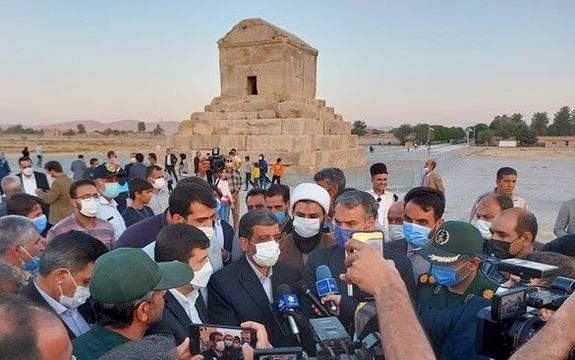
President Ebrahim Raisi (Raeesi) last week visited the ruins at Persepolis, the ceremonial capital of the Achaemenid Empire close to Pasargadae. Raisi said the palace complex was both a relic of Iranian art and "a message to oppressors to behold the fate of those who oppress the people."
Raisi critics have slammed the idea that the Achaemenids were "oppressors" and accused the president of undermining national identity. Persepolis and Pasargadae were both destroyed by Alexander the Great after the Achaemenid empire collapsed to the Greeks, Macedonians and their allies in 330 BC, some 200 years after the empire was founded in the 6th century BC by Cyrus.
The Achaemenid empire, which was strictly hierarchical and covered a variety of ethnic groups under the Persians, is minimally represented in school history books in Iran.Persepolis was a “dynastic, perhaps ritual, center,” wrote historian Richard Frye, where the priestly caste was influenced by the teachings of Zoroaster.
“Raisi and Zarghami's remarks showed they have no knowledge of and no interest in Iran's ancient history,” Morteza Kazemian, Iran International analyst, said Sunday. "They don't relate to that history and the symbols of Iranian identity in any way."
Esmail Kahrom, an environmentalist known internationally for his jointly edited book The Lion and the Gazelle, has warned that Cyrus tomb could sink into land holes caused by water extraction 40 years from now if agriculture expands. Kahrom, a former adviser to the head of the department of environment, has argued the local economy should rely on expanding tourism.
Kahrom has drawn a comparison to the historic Khajou Bridge in Esfahan, where the transfer of water from Zayandeh Roud to other provinces, and for use in agriculture and industry, has dried up the river over 20 years and led to cracks in the surrounding groundand the bridge’s structure.
There is also land subsidence at Esfahan’s airport, historic monuments, and residential and commercial buildings. Experts say Iran has under ten years to deal with land subsidence.
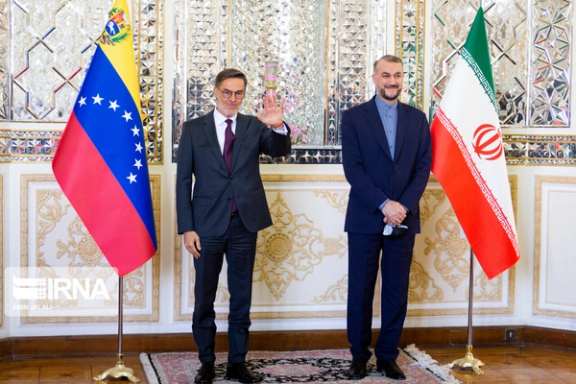
Iran’s foreign minister has said a 20-year cooperation agreement will be concluded with Venezuela during Nicolas Maduro’s trip to Iran in the coming months.
Hossein Amir Abdollahian spoke of the agreement during a joint press conference in Tehran with visiting Venezuelan foreign minister Felix Plasencia on Monday. He added that “We agreed to prepare a 20-year roadmap for cooperation between Tehran and Caracas.”
Iran has prepared a similar document with China, with its contents remaining obscure, which is a roadmap of expanded relations rather than a concrete bilateral treaty.
Amir-Abdollahian said a joint commission will prepare the document before Maduro’s trip to Iran.
While both countries are under heavy US sanctions which have pushed their economies into serious crises, Amir-Abdollahian spoke about Iranian goods being sold in Venezuela and investments opportunities in Iran.
President Ebrahim Raisi, who met with the Venezuelan foreign minister said later that Latin America “is a priority in Iran’s economic diplomacy” and a long-term plan must be prepared to “boost relations” to the maximum degree possible.
Plasencia said during the press conference that his trip to Tehran was his first foreign visit since he was named foreign minister in August.
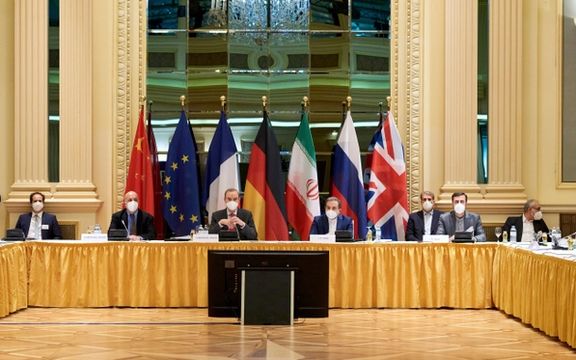
In confirming Monday their diplomats would meet in Brussels to review Iran’s stalled nuclear talks, EU foreign policy chief and Iran’s foreign ministry did not name a day.
For the European Union, Josep Borrell declined to confirm reports − citing an Iranian parliamentarian − that the meeting would be Thursday.
In Tehran, Saeed Khatibzadeh, spokesman of the foreign ministry, said that after a “constructive” visit last Thursday by Enrique Mora, the EU political director who coordinates the Vienna talks, Iran’s discussions with Europe would “continue in a few days in Brussels.”
The Vienna talks began in April but were suspended in June pending the Iranian presidential election and transition, but since then Iran has refused to return to negotiations. Aiming to restore Iran’s 2015 nuclear deal with world powers (the JCPOA, Joint Comprehensive Plan of Action), the talks failed to agree which United States sanctions needed to be lifted for Washington to return to the deal, which it left it 2018, and how Iran should bring its nuclear program back within JCPOA limits.
Neither the EU nor Iran has explained why they intend to liaise in Brussels. The Vienna talks formally involve all remaining parties to the JCPOA – China, France, Germany, Iran, Russia, and the United Kingdom – with the US taking part indirectly.
Asked about the future of the process as he arrived for an EU foreign ministers meeting in Luxembourg Monday, Borrell said he was “more optimistic today than yesterday.”
"No confirmation yet, but things are getting better and I am hopeful we will have preparatory meetings in Brussels in the days to come," he said.
New arrangement
In Tehran Khatibzadeh confirmed that the foreign ministry would continue to lead Iran’s diplomacy on the nuclear issue but with “a new arrangement.”
Asked if Ali Bagheri-Kani would take over the role as lead negotiator of Abbas Araghchi, whom he has replaced as a deputy foreign minister under President Ebrahim Raisi (Raeesi), Khatibzadeh confirmed Bagheri-Kani would lead the Iranian side in Brussels.
“Mr Bagheri will in his first opportunity present his views [opinions] to the European side,” Khatibzadeh explained.
A growing sense of urgency in European over the negotiations result results partly from concerns that the Raisi administration, which includes long-term critics of the JCPOA, will toughen Iran’s approach and partly from the experience Iran is gaining with an expanded nuclear program, which could undermine the non-proliferation calculations underpinning the 2015 agreement.
Khatibzadeh insisted that the onus in the nuclear talks lay in Washington. He also expressed Iran’s concerns over the value of any US commitments, given previous US president Donald Trump left the JCPOA unilaterally in 2018 and imposed ‘maximum pressure’ sanctions.
“All talk has been aimed at bringing back the US without preconditions to commitment to 2231,” he said, citing the United Nations Security Council resolution that endorsed the JCPOA.
“Our main goal is to make sure that all sanctions are ended and that decisions cannot be changed by anyone in Washington and there will be no games played against us. This can be achieved only in concrete talks.”
Discussions in Brussels, the spokesman said, would consider “the challenges and obstacles that were not bought to a conclusion (resolved) in Vienna.”